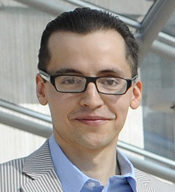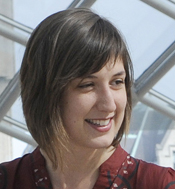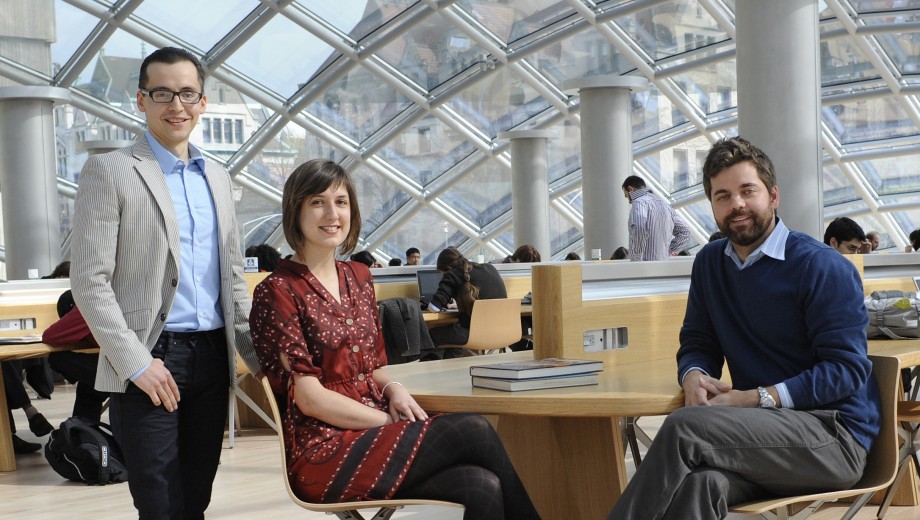Meet three PhD students who are launching lives as scholars: (from left) Jose Antonio Arellano in English; Caroline Schopp in art history, and V. Joshua Adams, AM'02, in comparative literature.
“The important thing is finding a text, or texts, you love, or a problem that matters deeply to you, and to work on that,” says comparative literature doctoral candidate V. Joshua Adams, AM'02, when asked what advice he’d give to incoming graduate students. Adams knows from experience, having spent the past several years focused on the nuances of lyric poetry.
For an inside look at graduate studies in the Humanities Division, Tableau chatted with Adams and two other PhD students: Jose Antonio Arellano in English language and literature and Caroline Schopp in art history. All are recipients of named fellowships, all are fervently immersed in their research, and all are getting the most out of their time at the University.
V. Joshua Adams, AM’02
Eighth-Year Student in Comparative Literature
Franke Institute Dissertation-Year Fellowship
 From divinity to literature: I enrolled in the University of Chicago Divinity School right out of college to pursue graduate work in religion and literature. While I was there I realized that literature, not religious studies, mattered more to me as an intellectual pursuit. Fortunately, one of my professors, Françoise Meltzer, also had an appointment in comparative literature, and she encouraged me to make the switch. I left UChicago for two years, worked in development, and came back as a PhD student in comparative literature in autumn 2004.
From divinity to literature: I enrolled in the University of Chicago Divinity School right out of college to pursue graduate work in religion and literature. While I was there I realized that literature, not religious studies, mattered more to me as an intellectual pursuit. Fortunately, one of my professors, Françoise Meltzer, also had an appointment in comparative literature, and she encouraged me to make the switch. I left UChicago for two years, worked in development, and came back as a PhD student in comparative literature in autumn 2004.
Why poetry? My research focuses on the subfield of literature and philosophy. The specific literature that interests me is lyric poetry, mostly from about 1800 onward. I wrote poetry in college and read widely in Continental philosophy; I came to feel that it was possible to have a stake in both sides of the famous “ancient quarrel between poetry and philosophy” that Plato mentions. Once I came back to Chicago I realized that a truce in this quarrel might also help literary critics defend the value of poetry in a way that wasn’t an example of preaching to the converted. This seemed like important and challenging work, and also very different from the approaches that currently dominate the field of literary studies.
Dissertation topic: My dissertation concerns attempts by poets to overcome the threat of what I am calling a “radical privacy”—the idea that something about our experience just cannot be shared, that we are not just different people, but that our inner lives are unintelligible to each other. My poets—Emily Dickinson, some of the French symbolists, and T. S. Eliot, so far—use poems to solve or at least forestall skeptical problems about our knowledge of ourselves or other people. They are not, as a rule, successful at solving or forestalling these problems. But the artifacts they create show us something about what it means to have this anxiety, and how one might deal with it.
"Rather than appeal to poetry's special status, I suggest that poetry occupies itself with problems that all of us have by virtue of being persons with minds." —V. Joshua Adams
I think of my dissertation as a more or less rational defense of writing and reading poetry. Rather than appeal to poetry’s special status, I suggest that poetry occupies itself with problems that all of us have by virtue of being persons with minds. This is, I think, a different way of articulating the value of poetry from the one that we are accustomed to hearing from poets and literary critics.
Most exciting research discovery: I discovered that Emily Dickinson uses inverted syllogisms in her poetry to collapse the distance between first-person and third-person experience.
A favorite sentence from his dissertation: “It is as if, for Dickinson, finding the right use of language will allow the successful transformation of what was inalienably hers into something that could be ours.” I like this sentence because I feel it accurately describes what Dickinson is doing, but also has potentially wider relevance for the work of other poets.
Words of wisdom for first-year students: The important thing is finding a text, or texts, you love, or a problem that matters deeply to you, and to work on that. A cliché, but it’s true. This is the best way to sustain interest over the long haul that is a PhD. And it is a long haul.
After graduation, what’s next? I plan on defending next year. I'll look for academic work first, but I'm not averse to searching for other kinds of positions.
Jose Antonio Arellano
Third-Year Student in English Language and Literature
Elaine H. and Roger P. Hansen Fellowship
 Coming to UChicago: I was born and raised on the South Side of Chicago. As a senior in high school, I was accepted to the College of the University of Chicago, and I saw that as a great achievement. Not to over-romanticize things, but a boy like me, growing up in my neighborhood, typically did not find himself at the University of Chicago. My family aspired to belong to the middle class, but that aspiration was out of reach most of the time. I attended the College only for one year. I was working full time, and just could not balance that with the rigorous course load. I got my undergraduate degree and a master’s in English literature from the University of Illinois at Chicago, and then decided to apply to doctoral programs, including UChicago, the school that I had always regretted leaving.
Coming to UChicago: I was born and raised on the South Side of Chicago. As a senior in high school, I was accepted to the College of the University of Chicago, and I saw that as a great achievement. Not to over-romanticize things, but a boy like me, growing up in my neighborhood, typically did not find himself at the University of Chicago. My family aspired to belong to the middle class, but that aspiration was out of reach most of the time. I attended the College only for one year. I was working full time, and just could not balance that with the rigorous course load. I got my undergraduate degree and a master’s in English literature from the University of Illinois at Chicago, and then decided to apply to doctoral programs, including UChicago, the school that I had always regretted leaving.
Area of study: My field is American literature, from the mid-nineteenth to the mid-twentieth century. Within that field, I study mostly novels but also some poetry and short stories.
His dissertation, so far: I’ve been looking at aesthetic form and how it relates to a work’s broader social context. To date, I’ve tracked that relationship as expressed by Edgar Allan Poe, Herman Melville, Henry James, Willa Cather, Ralph Ellison, and Richard Wright. Melville, for example, frequently stated that only in the realm of fiction can one find the beauty of symmetry—that if you bring truth into the work, it’s going to have “ragged edges.” This actually plays out in his novella Benito Cereno, which depicts a slave revolt on a ship. The story features a suspenseful narrative arc, with a fantastic climax, but it’s followed by a rather long and cumbersome legal deposition at the end. I think Melville made a calculated decision to set up a narrative arc and then, as it were, wreck it. On one hand, the story is a great read, but on the other, it’s meant to convey a message to the American people of the 1850s: “Slavery is going to blow up in our faces if we allow it to continue.” This truth, we might say, disrupted his form.
“I think Melville made a calculated decision to set up a narrative arc and then, as it were, wreck it.” — Jose Antonio Arellano
At UChicago, you have scholars like Kenneth Warren who are at the forefront of the discipline. Professor Warren is a fantastic scholar of Ralph Ellison, and he has been great in helping me think through how this all works. We’ve started talking about what my dissertation might look like, though that might change as I continue to read.
Inspirations: During my time here, I have attended some fascinating lectures, workshops, colloquia, and seminars. Renowned scholars from all over the world make it a point to stop at the University of Chicago and present their work, but some of the most memorable presentations have been from University faculty. For example, I learned a lot from the set of lectures given by philosophy professor Robert Pippin, who described the nature of agency as it is complexly expressed in film noir.
After graduation, what’s next? At this point, the goal—and it might be a naïve goal, but it’s still a really hopeful goal—is to find a tenure-track position. To be honest, though, I’m also comfortable with not having that. I was an adjunct instructor in the past, and I was happy doing it. Just being in a classroom and thinking through difficult problems with smart students is an incredibly rewarding experience.
Caroline Schopp
Second-Year Student in Art History
Neubauer Family Presidential Fellowship
 The road to Chicago: I did my undergraduate studies at Harvard but applied to PhD programs from Germany, where I was finishing a master’s in cultural studies at Humboldt University. In looking at prospective doctoral programs in the States, I wanted to find a university where the art history department and the German department seemed to be working together, where there was overlap in faculty interests and an active dialogue. UChicago has just that sort of dynamic.
The road to Chicago: I did my undergraduate studies at Harvard but applied to PhD programs from Germany, where I was finishing a master’s in cultural studies at Humboldt University. In looking at prospective doctoral programs in the States, I wanted to find a university where the art history department and the German department seemed to be working together, where there was overlap in faculty interests and an active dialogue. UChicago has just that sort of dynamic.
A possible dissertation topic: I came to UChicago having a good idea of my research interests, at least in terms of geography and time period, and I did preliminary research this summer first in France, then in Austria. I met with artists who, during the late 1950s through the end of the ’60s, collaborated in Vienna on cabarets, poetry, and visual works. During the post-war period, artists in America and Europe were radically rethinking what it means to make an artistic choice—questions of public performance and engagement of the spectator were crucial. A lot of work is being done right now on such event or action driven art, which is sometimes called “happenings.” For the most part, Viennese artists have been left out of the discussion, although they were asking similar questions and were moved by intense, important historical events. I would like to place their works within the broader European context that shaped them and to which they have contributed a great deal.
“I have always loved that art history presents the possibility for shaping an academic career that involves curating.” —Caroline Schopp
Many of these artists are now in their late 70s or early 80s, and making the first phone calls to set up interviews was a bit nerve-wracking. Fortunately no one spoke to me in the Viennese dialect! And meeting these artists has ultimately been so rewarding. I really made connections with some of them and have since been in touch—I recently sent the artist Günter Brus a translation of an essay he published in the 1970s. In it, he’s interested in a question similar to the one I am asking now: why are the cabarets of Austrian artists left out of this dialogue that is shaping up around the happenings?
Exploring art: I’ve been able to take classes across the board. I’m doing my minor in medieval art, and some of the most amazing courses I’ve taken have been in that field with Aden Kumler: one on iconography last year and an equally challenging and ambitiously framed course this winter on allegory. These courses have really made me think not only about the medieval period, but also about the nature of art historical investigation and looking at images. I also worked with Wu Hung last spring on contemporary Chinese art. That course blew my mind, putting the post-war period into a new and exciting context. It was thrilling to see areas of overlap, shared interests between artists I’d never considered and post-war artists in Vienna.
After graduation, what’s next? I have always loved that art history presents the possibility for shaping an academic career that involves curating. When I finish coursework this year, I’d love to get experience working in a museum, and to eventually curate an exhibition of the works that I’m studying. That’s what makes writing the dissertation so exciting—I imagine, at least I hope, that I won’t always just be writing about these artworks, but also bringing them into other contexts and into some kind of constellation with other international works from the period.

